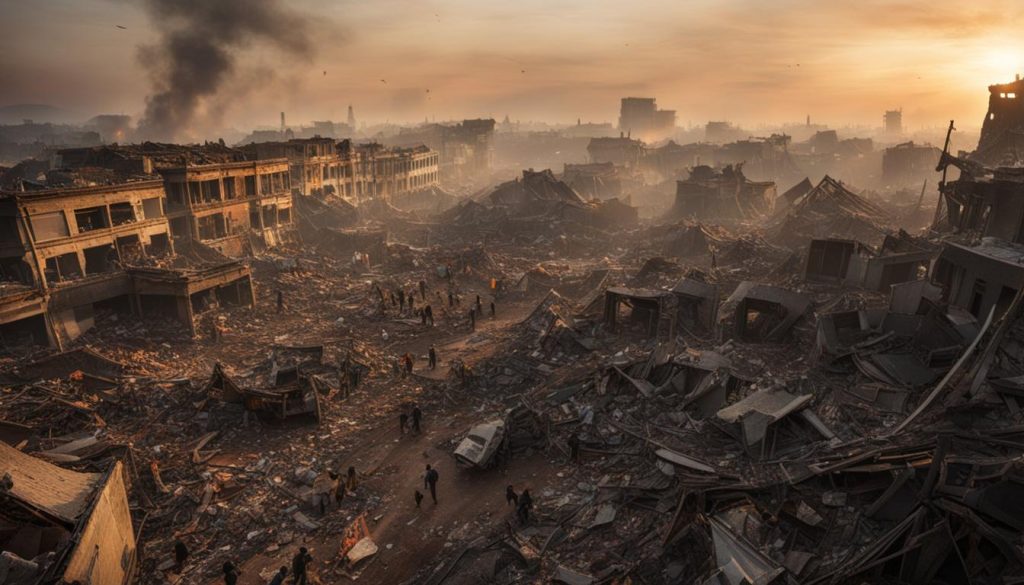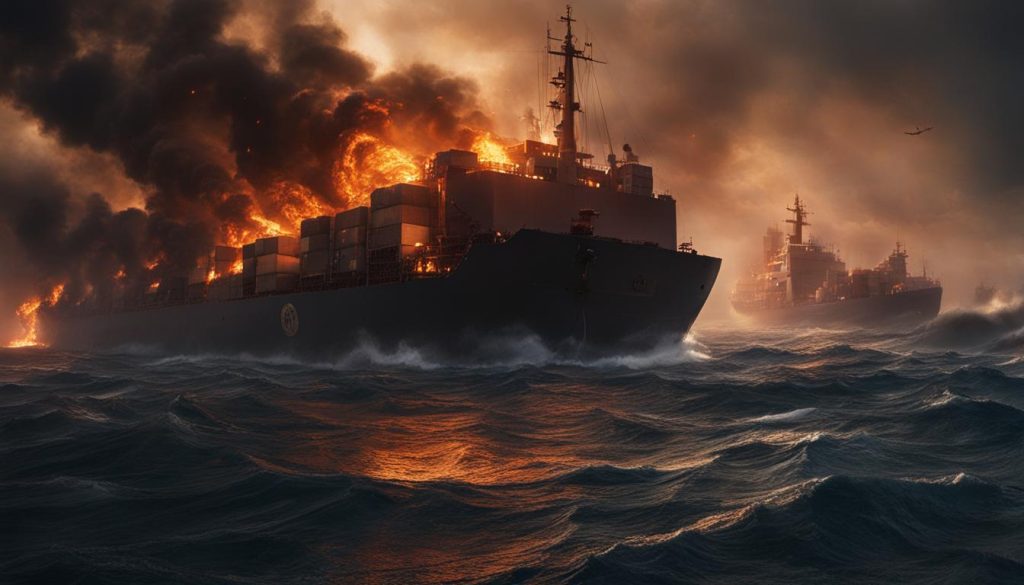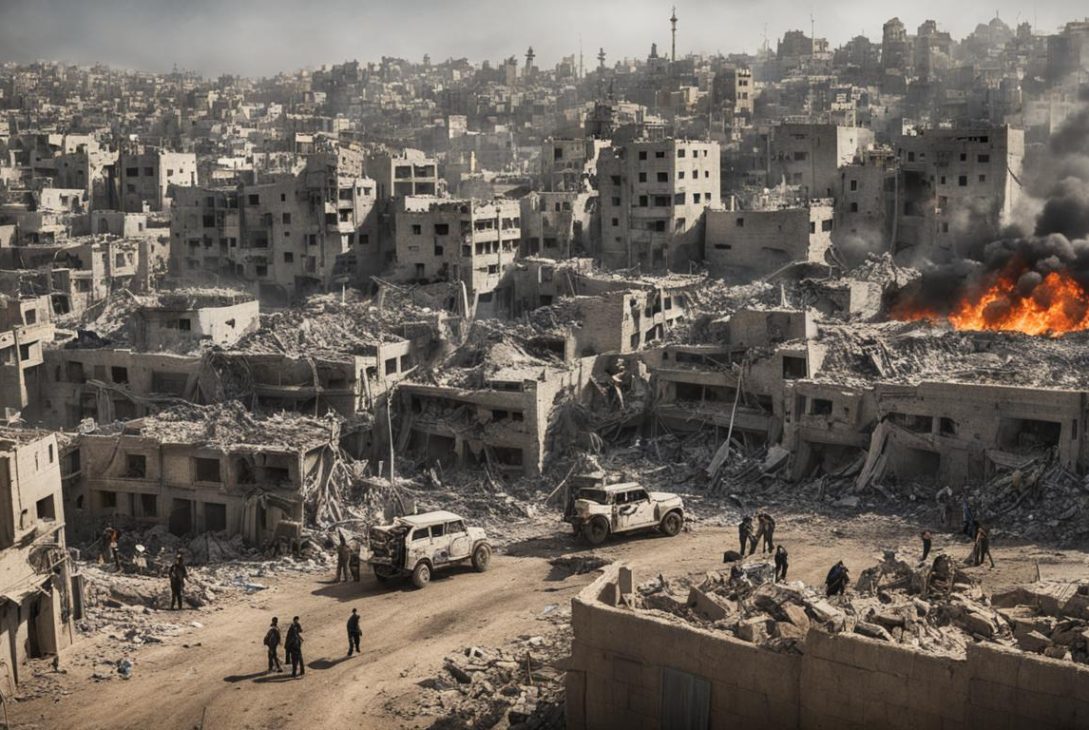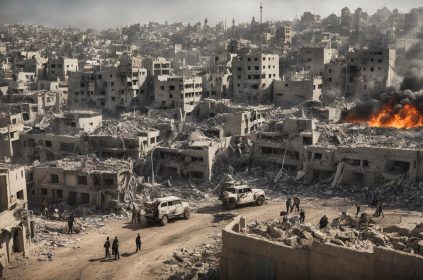Stay updated with the latest news on the Israeli-Palestinian conflict with our live updates on the Israel war. The conflict between Israel and Hamas in the Gaza Strip has been intensifying, with ongoing military operations by the Israeli Defense Forces (IDF) and escalating tensions in the Middle East.
In recent developments, the IDF has taken control of Gaza City’s south and successfully pushed Hamas out of the Shejaia neighborhood. The ground troops have also discovered a weapons cache hidden inside a school in Jabalya, further highlighting the complex situation on the ground.
Key Takeaways:
- Follow our live updates to stay informed on the evolving Israeli-Palestinian conflict.
- The IDF has gained control over parts of Gaza City, pushing Hamas out of strategic areas.
- A weapons cache was found hidden in a school in Jabalya, underscoring the complexity of the conflict.
- Stay informed to understand the current situation in the Middle East.
- Check back for more updates on the ongoing Israel war.
Hamas Releases Video of Three Gaza Hostages Killed in Captivity
Hamas has released a video showcasing three hostages who were tragically killed while in their captivity. Elia Toledano, Nik Beizer, and Ron Sherman were held by Hamas, and their bodies were later recovered by the Israeli Defense Forces (IDF).
The video, released by Hamas, includes disturbing footage and statements claiming that they tried to keep the hostages alive. However, they allege that Israeli Prime Minister Benjamin Netanyahu insisted on killing them, further perpetuating the deep-seated tensions in the Israeli-Palestinian conflict.
Hostage Victims:
| Hostage Name | Status |
|---|---|
| Elia Toledano | Deceased |
| Nik Beizer | Deceased |
| Ron Sherman | Deceased |
“We deeply mourn the loss of these innocent lives and condemn the senseless violence perpetuated by Hamas. This tragic incident further underscores the urgency to find a lasting solution to the Israeli-Palestinian conflict,” said an IDF spokesperson.
As the Israeli-Palestinian conflict continues to escalate, incidents like this highlight the complexity and severity of the situation. The release of this video by Hamas adds another dimension to the ongoing conflict and further fuels tension between the two factions.
IDF Special Forces Takes Over Gaza Tunnel Shaft
In a significant development during the ongoing Israeli-Palestinian conflict, the Israeli Defense Forces (IDF) special forces combat team, known as the LOTAR unit, successfully carried out operational activities in the Gaza Strip. This marks the first time the elite IDF special forces have entered Gaza.
Their mission led them to observe a terrorist emerging from a tunnel in Beit Hanoun. With swift precision, the IDF immediately engaged in a firefight to neutralize the threat. Unyielding in their commitment to security, the IDF successfully eliminated the terrorist and effectively destroyed the tunnel shaft.
The IDF’s ability to infiltrate and take control of the Gaza tunnel shaft demonstrates their operational prowess, swift response capabilities, and dedication to ensuring the safety and security of Israeli citizens amidst the complex and challenging landscape of the Israeli-Palestinian conflict.
By thwarting terrorist activities and eliminating potential threats, the IDF’s special forces play a crucial role in maintaining stability and safeguarding Israeli communities. Their strategic actions help to mitigate the risk posed by underground tunnels, which have been utilized by militant groups to carry out attacks on Israeli civilians and military personnel.
The IDF’s successful operation in taking over the Gaza tunnel shaft is a testament to their unwavering determination and commitment to defending Israel from security threats. With their specialized training, advanced equipment, and unparalleled expertise, the IDF special forces continue to make significant contributions in the fight against terrorism during the Israeli-Palestinian conflict.
Key Takeaways:
- The IDF’s special forces combat team, known as the LOTAR unit, carried out operational activities in Gaza for the first time.
- They observed a terrorist emerging from a tunnel in Beit Hanoun and engaged in a firefight, successfully eliminating the threat.
- The IDF destroyed the tunnel shaft, effectively neutralizing a potential route for terrorist activities.
- Their actions demonstrate the IDF’s commitment to security and their ability to thwart underground threats posed by militant groups.
| Benefits of IDF Special Forces’ Operation | Implications for Israeli Security |
|---|---|
| – Disruption of terrorist networks | – Enhanced protection for Israeli communities |
| – Neutralization of potential threats | – Mitigation of underground tunnel risks |
| – Strengthening of deterrence against terrorism | – Continued efforts to ensure Israeli safety |
Jordanian Newspaper Publishes Cartoon of Netanyahu Drinking Blood
A Jordanian newspaper has sparked controversy by publishing a highly controversial cartoon depicting Israeli Prime Minister Benjamin Netanyahu drinking blood. The cartoon, depicting Netanyahu with fangs and a blood-stained mouth, reinforces the prevalence of antisemitic themes and conspiracy theories within certain segments of the Arab press.
The publication of such a cartoon is deeply concerning, particularly within the context of the ongoing Israeli-Palestinian conflict. It perpetuates harmful stereotypes and contributes to the further inflaming of tensions between the two sides.
“The cartoon published by the Jordanian newspaper is a clear example of the type of incitement that perpetuates hatred and animosity,” said a spokesperson for the Israeli government.
This incident serves as a reminder of the power of media in shaping public opinion and the responsibility that journalists and news outlets have in ensuring the dissemination of accurate and fair information. It is crucial to distinguish between legitimate criticism and the promotion of hate speech, which only serves to undermine the prospects for peace and reconciliation.
The Israeli-Palestinian conflict is a complex and multifaceted issue that warrants thoughtful and respectful discussions. It is important to engage in constructive dialogue and to challenge stereotypes and biases to foster understanding and empathy between the parties involved.
As the conflict continues to unfold, it is imperative that news outlets exercise caution and adhere to ethical standards in their reporting. Sensationalism and the propagation of inflammatory imagery only serve to fuel tensions and hinder the chances of a peaceful resolution.
UAE Foreign Minister Meets PLO Official to Discuss Humanitarian Crisis in Gaza
The foreign minister of the United Arab Emirates, Sheikh Abdullah bin Zayed, is actively engaging in diplomatic efforts to address the humanitarian crisis in Gaza resulting from the ongoing Israeli-Palestinian conflict. Recently, Sheikh Abdullah bin Zayed held a crucial meeting with a senior Palestine Liberation Organisation (PLO) official, aiming to find a way forward and alleviate the dire conditions faced by the Gazan population.
The meeting centered around the urgent need for international cooperation and immediate action to achieve a ceasefire in the region. As the humanitarian situation worsens, the UAE foreign minister and the PLO official discussed strategies to provide essential aid and assistance to the people of Gaza, focusing on the immediate needs for medical supplies, food, water, and shelter.
Both sides acknowledged the urgent nature of resolving this crisis and the shared responsibility to protect and support the rights and well-being of the affected population. The UAE foreign minister underscored the importance of collective efforts from the international community, emphasizing the need for sustained dialogue and collaboration.
In this critical time, the United Arab Emirates remains committed to providing humanitarian assistance to the Palestinians in Gaza. Sheikh Abdullah bin Zayed reaffirmed the UAE’s dedication to alleviating the suffering caused by the conflict and urged all stakeholders to work together towards a peaceful resolution.
“It is imperative that we come together to find a just and lasting solution to the humanitarian crisis in Gaza. Our priority should be to ensure the well-being and safety of the innocent civilians affected by the conflict, and we must act swiftly to provide them with the necessary support,” said Sheikh Abdullah bin Zayed during the meeting.
The UAE’s proactive engagement in addressing the humanitarian crisis in Gaza underscores the commitment to stability and peace in the region. By fostering diplomatic channels and advocating for immediate action, the UAE plays a significant role in mobilizing international efforts towards achieving a sustainable ceasefire and creating a pathway for long-term peace negotiations between Israel and Palestine.

The Escalating Humanitarian Crisis in Gaza
The situation in Gaza has reached critical levels, with the civilian population bearing the brunt of a multifaceted humanitarian crisis. As the Israeli-Palestinian conflict persists, the consequences of the ongoing violence have taken a severe toll on the lives and livelihoods of Gazans.
- Widespread destruction of infrastructure, including homes, hospitals, and schools, has left thousands displaced and without basic necessities.
- Ambulance services and medical facilities are overwhelmed, struggling to provide urgent healthcare services to the injured and vulnerable.
- The shortage of clean water, electricity, and sanitation facilities further exacerbates the dire conditions in Gaza.
- Access to essential food supplies has become increasingly limited, leading to food insecurity and malnutrition.
- The psychological impact on the population, particularly children, is alarming, with long-lasting trauma and mental health concerns.
Immediate action is crucial to prevent further loss of life and address the urgent human rights and humanitarian needs in Gaza. The meeting between the UAE foreign minister and the PLO official signifies a collective commitment to finding sustainable solutions and working towards lasting peace in the region.
Jordan’s King Abdullah Says Israeli Actions in Gaza Risk ‘Catastrophic Repercussions’
Jordan’s King Abdullah has expressed deep concern over Israeli actions in Gaza, warning that they could have catastrophic repercussions throughout the Middle East. The ongoing Israeli-Palestinian conflict has fueled tensions in the region, and King Abdullah has called on the international community to take decisive action to address the situation.
Amid escalating violence and civilian casualties, the king emphasized the urgent need for Israel to end its military campaign in Gaza and provide essential aid to the Palestinian population. He stressed that continued Israeli actions not only exacerbate tensions in the Middle East but also hinder efforts towards a lasting peace.
The conflict in Gaza has strained longstanding regional alliances and further polarized opinions on the Israeli-Palestinian issue. King Abdullah’s outspoken remarks highlight the growing concerns among Middle Eastern leaders regarding the humanitarian crisis and the broader implications of the Israeli actions.
The Jordanian monarch’s call for international pressure on Israel underscores the need for a concerted effort to de-escalate the conflict and resumption of dialogue towards a sustainable resolution. The impetus lies with the global community to engage in diplomatic initiatives that uphold the principles of peace, justice, and stability in the region.
Ivanka Trump, Jared Kushner Visit Decimated Kibbutz in Israel’s South
Ivanka Trump and Jared Kushner, former senior advisors to former US President Donald Trump, showed their support for Israel by visiting a decimated kibbutz in the south of the country. The kibbutz had been severely affected by the ongoing Israel-Gaza war, with residents experiencing the devastating consequences of the conflict.
During their visit, Ivanka Trump and Jared Kushner listened to heartfelt testimonies from the local residents who had been directly impacted by the brutal Hamas attack on October 7. The couple’s presence served as a gesture of solidarity, offering comfort, reassurance, and a symbol of the unwavering support of the United States towards Israel in this challenging time.
“We stand with Israel and its people during this difficult period. The resilience and strength demonstrated by the residents of this decimated kibbutz are truly inspiring,”
said Ivanka Trump during their visit.
The image below captures Ivanka Trump and Jared Kushner’s visit to the decimated kibbutz:
| Impact of Hamas attack on the kibbutz | Efforts to rebuild and support the kibbutz |
|---|---|
| – Infrastructure damage | – Assistance from Israeli government |
| – Emotional trauma for residents | – Humanitarian aid from international organizations |
| – Displacement of families | – Psychological support for affected individuals |
The table above summarizes the impact of the Hamas attack on the kibbutz as well as the ongoing efforts to rebuild and support the community. The infrastructure damage and emotional trauma experienced by the residents highlight the urgent need for assistance and support from both the Israeli government and international organizations.
By visiting the decimated kibbutz, Ivanka Trump and Jared Kushner aimed to bring attention to the plight of the Israeli people and emphasize the importance of solidarity and support during this challenging time.
Iraq Sends Fuel Ship to Egypt to Help Gaza
In an effort to address the fuel shortage in Gaza resulting from the ongoing conflict, Iraq has taken a humanitarian step by sending a fuel tanker to Egypt. This initiative aims to alleviate the suffering of the people in Gaza who are currently experiencing the detrimental impacts of the fuel crisis on their daily lives.
The shipment of fuel from Iraq demonstrates the country’s commitment to supporting the region during these challenging times. By providing much-needed fuel resources, Iraq is contributing to the relief efforts and striving to mitigate the humanitarian crisis unfolding in Gaza.
As a result of the ongoing conflict between Israel and Palestine, the availability of fuel in Gaza has dwindled significantly. This shortage has had a severe impact on various aspects of daily life, including transportation, healthcare facilities, and power supply. The arrival of the fuel tanker from Iraq offers a glimmer of hope, providing temporary respite to the affected population.
The Iraqi government’s commitment to helping Gaza does not stop with this initial shipment. Plans are underway to send further aid cargoes in the future, ensuring that the humanitarian situation in Gaza receives continued support and attention.
| Impact of Fuel Shortage in Gaza | Consequences |
|---|---|
| Transportation | – Limited access to fuel makes it difficult for vehicles and public transportation systems to operate efficiently, impacting mobility for individuals and goods. |
| Healthcare Facilities | – The shortage of fuel affects the operation of medical facilities, including hospitals and clinics, hindering their ability to provide essential services to patients. |
| Power Supply | – Insufficient fuel availability leads to power outages and inadequate energy supply to homes and businesses, further exacerbating the challenging circumstances faced by the population. |
More Ships to Avoid Red Sea as Attacks Disrupt World Trade
Due to the increasing number of attacks in the Red Sea, the shipping industry is anticipated to divert more vessels from the area, causing significant disruption to world trade. The Red Sea, a strategic maritime route connecting Asia, Africa, and Europe, has become a hotspot for security concerns, impacting global supply chains and economic stability.
The attacks in the Red Sea are primarily orchestrated by the Houthi rebels, who have been engaged in conflict with the Saudi-led coalition in Yemen. These attacks target commercial vessels, including container ships and oil tankers, raising concerns about the safety of maritime trade routes and the security of global supply chains.
The Houthi leader has further escalated tensions by openly threatening to expand their attacks to include United States naval ships. These threats pose a significant risk to global security and have prompted increased vigilance among maritime stakeholders, leading to the decision to reroute ships away from the Red Sea.
By avoiding the Red Sea, shipping companies aim to mitigate the potential risks associated with these attacks and safeguard the smooth flow of international trade. However, diverting traffic away from the Red Sea presents its own challenges, including longer transit times, increased costs, and potential strain on alternative routes.
As a result, the disruption caused by the attacks in the Red Sea extends beyond immediate security concerns, impacting the efficiency and reliability of global supply chains. It underscores the need for international collaboration and robust security measures to ensure the safe passage of goods and sustain global trade.
“The attacks in the Red Sea pose a serious threat not only to the shipping industry but also to the stability of global trade. With more ships avoiding the area, it is crucial for stakeholders to work together to find sustainable solutions and mitigate the impact on world trade.” – Maritime Expert
Impact on Trade and Economy
The attacks in the Red Sea have far-reaching consequences for trade and the global economy. By disrupting the flow of goods through this critical shipping route, the attacks have the potential to cause delays, shortages, and price fluctuations in various industries.
The diversion of ships from the Red Sea not only affects markets dependent on timely imports and exports but also increases transportation costs and adds complexity to supply chain operations. As a result, companies may need to reevaluate their sourcing strategies, logistics networks, and contingency plans to cope with the disruption caused by the attacks.
The chart below illustrates the potential impact of Red Sea attacks on different sectors:
| Industry | Impact |
|---|---|
| Container Shipping | Delays, increased costs, rerouting |
| Oil and Gas | Supply chain disruptions, volatile prices |
| Automotive | Delay in parts delivery, production slowdown |
| Retail | Inventory shortages, higher prices |

Ukraine Increases Borrowing for Early 2024 Over ‘Lack of Foreign Support’
In the midst of the Russian conflict, Ukraine finds itself facing a significant financial challenge. The country’s finance minister has recently announced that Ukraine will be forced to increase its domestic borrowing in the first two months of 2024 due to a lack of foreign support. This is a crucial issue for Ukraine as it struggles to meet its financial obligations amidst the ongoing crisis.
The United States and the European Union, two vital sources of foreign support, have been unable to reach an agreement on further aid funding for Ukraine. This lack of consensus has left Ukraine in a vulnerable position, necessitating the exploration of alternative measures to address its financial needs.
With Russia’s continued aggression and the financial strain it has imposed, Ukraine must adapt swiftly to safeguard its economy and fulfill its national obligations. The Ukrainian government’s decision to increase domestic borrowing is a necessary step to ensure the stability and welfare of its citizens.
“The Ukrainian finance minister emphasized the urgent need for financial resources to navigate the challenging circumstances we face. The lack of foreign support leaves us with no choice but to prioritize domestic borrowing as a means to sustain our economy.” – Ukrainian government spokesperson
The decision to increase domestic borrowing highlights the critical role it plays in addressing the financial challenges caused by the Russian conflict. Although it is a necessary step, it also underscores the urgency for international partners to extend their support and provide the necessary aid to stabilize Ukraine’s economy entirely.
Ukraine’s Borrowing Status
| Year | Foreign Borrowing (in billions) | Domestic Borrowing (in billions) |
|---|---|---|
| 2020 | 15.2 | 7.8 |
| 2021 | 12.5 | 9.6 |
| 2022 | 10.6 | 11.3 |
| 2023 | 8.9 | 14.7 |
| 2024 (Projected) | 6.4 | 18.2* |
*Projected value
The table above demonstrates the changing landscape of Ukraine’s borrowing patterns in recent years. While foreign borrowing has decreased steadily, domestic borrowing has risen in response to the country’s evolving financial needs. The projected increase in domestic borrowing for early 2024 is a reflection of the critical reliance on internal sources of financing in the face of limited foreign support.
The Ukrainian government remains committed to exploring all available avenues to secure the necessary funding and support to address its financial challenges. Efforts are underway to strengthen Ukraine’s economy and ensure its stability amidst the ongoing Russian conflict. However, the urgent need for foreign support and the resolution of geopolitical tensions cannot be overstated.
Conclusion
The ongoing Israeli-Palestinian conflict continues to escalate, with various developments and updates emerging. The Israeli Defense Forces (IDF) have made significant progress in their operations in Gaza, taking control of strategic areas and discovering hidden weapons caches. However, Hamas remains active and has released a disturbing video showing the deaths of three hostages.
International efforts are underway to address the humanitarian crisis in Gaza. UAE Foreign Minister Sheikh Abdullah bin Zayed has met with senior Palestine Liberation Organisation (PLO) officials to discuss urgent aid and a potential ceasefire. Meanwhile, Jordan’s King Abdullah has expressed concern over the consequences of Israeli actions in Gaza, calling for international pressure to end the military campaign.
Amidst the ongoing conflict, prominent figures such as Ivanka Trump and Jared Kushner have visited affected areas in Israel, offering their support. Additionally, Iraq has sent a fuel ship to Egypt to alleviate the fuel shortage in Gaza. However, attacks in the Red Sea and threats from Houthi leaders pose risks to global security and disrupt world trade.
As the situation remains fluid and complex, it is crucial for individuals to stay informed about the latest updates on the ongoing Israeli-Palestinian conflict to understand the evolving dynamics in the Middle East.
FAQ
What is the latest update on the Israeli-Palestinian conflict?
The Israeli Defense Forces (IDF) have taken control of Gaza City’s south and pushed Hamas out of the Shejaia neighborhood. IDF ground troops have also discovered a weapons cache hidden inside a school in Jabalya. The conflict is ongoing, and the IDF continues its operations in the Gaza Strip.
What has Hamas released a video of?
Hamas has released a video showcasing three hostages who were killed while in their captivity. Elia Toledano, Nik Beizer, and Ron Sherman were held by Hamas, and their bodies were later recovered by the IDF. The video includes statements from Hamas claiming that they tried to keep the hostages alive, but Israeli Prime Minister Benjamin Netanyahu insisted on killing them.
What did the IDF special forces do in Gaza?
The IDF’s special forces combat team, known as the LOTAR unit, conducted operational activities in Gaza for the first time. The team observed a terrorist emerging from a tunnel in Beit Hanoun and engaged in a firefight. The IDF successfully eliminated the terrorist and destroyed the tunnel shaft.
What controversial cartoon has been published in a Jordanian newspaper?
A Jordanian newspaper has published a cartoon depicting Israeli Prime Minister Benjamin Netanyahu drinking blood. This report highlights the prevalence of antisemitic themes and conspiracy theories in the Arab press, particularly during the ongoing Israeli-Palestinian conflict.
Who met to discuss the humanitarian crisis in Gaza?
The foreign minister of the United Arab Emirates, Sheikh Abdullah bin Zayed, met with a senior Palestine Liberation Organisation (PLO) official to discuss the escalating humanitarian crisis in Gaza. The meeting focused on international efforts aimed at reaching an immediate ceasefire in the Israeli-Palestinian conflict.
What has Jordan’s King Abdullah expressed concern over?
Jordan’s King Abdullah expressed concern over Israeli actions in Gaza, stating that they could lead to catastrophic repercussions in the region. He called for the international community to pressure Israel to end its military campaign and provide much-needed aid to the Palestinian population in Gaza.
Who visited a decimated kibbutz in Israel’s south?
Ivanka Trump and Jared Kushner, former senior advisors to former US President Donald Trump, visited a decimated kibbutz in Israel’s south to express solidarity with the country during the ongoing Israel-Gaza war. They listened to testimonies from local residents who were affected by the Hamas attack on October 7.
What aid has Iraq sent to help alleviate the fuel shortage in Gaza?
In an effort to alleviate the fuel shortage in Gaza caused by the ongoing conflict, Iraq has sent a fuel tanker to Egypt. The Iraqi government plans to send further aid cargoes in the future to support the humanitarian situation in Gaza.
Why are more ships expected to avoid the Red Sea?
Due to increased attacks in the Red Sea, more ships are expected to avoid the area, disrupting world trade. The Houthi leader has also threatened to escalate attacks to include US naval ships, posing a potential threat to global security.
Why does Ukraine need to increase domestic borrowing?
Ukraine’s finance minister has stated that the country will need to increase domestic borrowing in the first two months of 2024 due to a lack of foreign support. The US and EU are struggling to agree on further aid funding for Ukraine, leaving the country in need of alternative measures to meet its financial obligations.
What is the ongoing Israeli-Palestinian conflict?
The ongoing Israeli-Palestinian conflict continues to escalate, with various developments and updates emerging. From IDF operations in Gaza to international efforts to address the humanitarian crisis, the situation remains fluid and complex. It is crucial to stay informed on the latest Israel war updates to understand the evolving situation in the Middle East.
Source Links
- https://www.jpost.com/israel-hamas-war/2023-12-21/live-updates-778933
- https://www.nytimes.com/live/2023/12/21/world/israel-hamas-war-gaza-news
- https://news.sky.com/story/ukraine-russia-war-latest-paramilitary-group-claims-russian-platoon-base-destroyed-in-cross-border-attack-12541713
IDF Special Forces Takes Over Gaza Tunnel Shaft israel war updates: live conflict reports
Last modified: January 17, 2024






